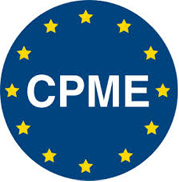 In times where measles and rubella are gaining momentum in the European Region, the WHO goal to eliminate both diseases by 2015, and maintain the European region as polio-free, is fully supported by the CPME.
In times where measles and rubella are gaining momentum in the European Region, the WHO goal to eliminate both diseases by 2015, and maintain the European region as polio-free, is fully supported by the CPME.
At its board meeting on 27 April, CPME comprising national medical associations from 32 European countries renewed its commitment to contribute to a long standing policy of preventive medicine with particular emphasis on vaccination by adopting a CPME Policy on Childhood Immunisation.
Only last year, CPME held a multi-stakeholder conference on the issue of “Prevention through Childhood Vaccination – Defining Doctors’ Roles in the Stakeholder Debate” jointly with the European Centre for disease prevention and control (ECDC) in Brussels with approximately 80 participants, including representatives from ECDC, National Medical Associations, the European Commission, WHO-Europe and the European Patients’ Forum.
As part of the outcome of this conference, CPME and ECDC agreed to take policy action with a view to repositioning the issue on the agendas at national level. The new CPME policy is CPME’s contribution to the agreement.
Already back in 1993 (Specific recommendation on preventive medicine) CPME had recommended that there should be:
– A common European schedule of vaccinations;
– Co-operative agreements between the medical profession and the public health authorities to ensure proper application and high uptake of the programmes.
The latest CPME policy goes further and touches on medical practices and training, communication and outreach as well as governance and co-operation.
Regarding medical practice, physicians do not exclude themselves from action points: they are required to take care of their own vaccination according to national schedules. While national immunisation schedules are to be promoted and further elaborated with the help of physicians, they should be decoupled from financial incentives which risk implying a conflict of interest.
On the issue of communication and outreach, the importance of high quality, up-to-date and evidence-based information was underlined. New communication channels and social media should be included in any communication strategy.
Particular attention needs to be paid to “hard-to-reach” population groups with low vaccination up-take, including vaccination sceptics, but also to vulnerable groups whose ties with the formal healthcare systems are weak. “Immunisation ambassadors” and good practices on communication should guide the way here.
With regard to governance and co-operation, CPME’s recommendation of 1993, i.e. a European immunisation schedule, was again put onto the table for decision makers to take up. Close co-operation between public authorities at national level, ECDC and WHO-Europe seems to be key in order to get there.
Furthermore, a formal framework for co-operation between public authorities and representatives of the medical profession should be set up.
Last, but not least, it was also agreed that wherever work is done, both at EU and national level, the procurement of vaccines should be subject to the greatest possible transparency.
Birgit Beger is the Secretary General of the Standing Committee of Europe Doctors/Comité Permanent des Médecins Européens (CPME)




